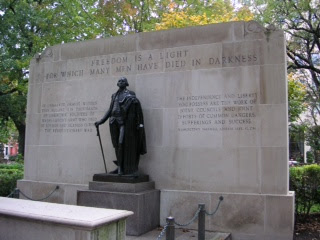Once "We the People" had declared our intention to "form a more perfect union," the Constitution needed to describe how that was to be done. It is the details contained in the following 7 Articles of the Constitution that have both allowed the United States of America to succeed as a democracy and have often proven difficult to implement. In very brief summary, provided primarily to inspire readers of this blog to review the full text of the Constitution for themselves, here are the 7 Articles.
 |
| United States Capitol, west front |
Article I: Section 1 reads, "All legislative Power herein granted shall be vested in a Congress of the United States, which shall consist of a Senate and House of Representatives." Sec. 2 describes the makeup and powers of the House, and Sec. 3 does the same for the Senate. Sec. 4 assigns the role of each State in selecting their Senators and Representatives. Sec. 5 deals with the manner of conducting the business of each house, and Sec. 6 describes compensation, as well as certain privileges from arrest. Sec. 7 assigns raising Revenue to the House and gives the Senate the power to propose or concur with amendments, and describes the process for passage of bills. Sec. 8 defines specific powers given Congress, and Sec. 9 lists specific powers excluded. Sec. 10 specifically limits the powers of States.
 |
| White House, north & south exposures |
Article II: Section 1 deals with the manner of election of the President; Sec. 2 describes the President's powers; and Sec. 3 deals with the President's responsibility to inform and recommend to Congress, receive Ambassadors and Public Ministers, take care that the Laws be faithfully executed, and Commission all the Officers of the United States. Section 4 addresses grounds for impeachment of not only the President and Vice President but also all civil Officers of the U.S.
 |
| Dole Center, Lawrence, KS |
Article III: Section 1 describes not only the Supreme Court but also lower federal courts, and describes judges' tenures as limited only by lack of good behavior; further it deals with compensation of judges. Sec. 2 describes the nature of cases to be heard, and Sec. 3 deals with Treason.
Article IV: As our nation has grown, the number of stars on our flag has increased, and Article IV deals with the relationship of the federal government with the states and their citizens.
 |
| Photo credit: Larry D. Fenwick |
Article V: It was anticipated even as the Constitution was being drafted that there would be the need for Amendments, and Article V provides for that. The image of me seated beside a granite text of the First Amendment was taken in Philadelphia with Constitution Hall in the background.
Article VI: While Article VI consists of 3 paragraphs, they are not enumerated as separate sections. The first paragraph deals with debts incurred during the Revolutionary period. The second paragraph imposes on the states recognition of the Constitution, laws, and treaties as the supreme Law of the Land, such that states cannot ignore or amend them. Finally, Officials of the U.S. and the States shall be bound by Oath or Affirmation, and no religious Test shall ever be required.
 |
| Memorial to Soldiers in Philidelphia |
Article VII: Twelve states--NH, MA, CT, NY, NJ, PA, DE, MD, VA, NC, SC, and GA--were represented among the signers of the Constitution, but Article VII provides that ratification by nine states shall be sufficient for the Establishment of the Constitution.
In conclusion, the risk of offering such a brief summary is that confusion or misimpression may result. Our Constitution is the treasure at the heart of our nation. Some of us studied it in school, but full appreciation is difficult for the young. I hope this blog makes many of you curious to read or re-read our Constitution. Even in the midst of our busy lives, it is worth setting aside the time. And, the truth is that such an amazing document is actually very short.
The people's voices are heard through elections, and Isaac B. Werner voted in elections in which the voices of Kansas farmers came together to express the power of the common man. As the strength of political parties wax and wane, it is the Constitution that holds the nation together.
The people's voices are heard through elections, and Isaac B. Werner voted in elections in which the voices of Kansas farmers came together to express the power of the common man. As the strength of political parties wax and wane, it is the Constitution that holds the nation together.
No comments:
Post a Comment